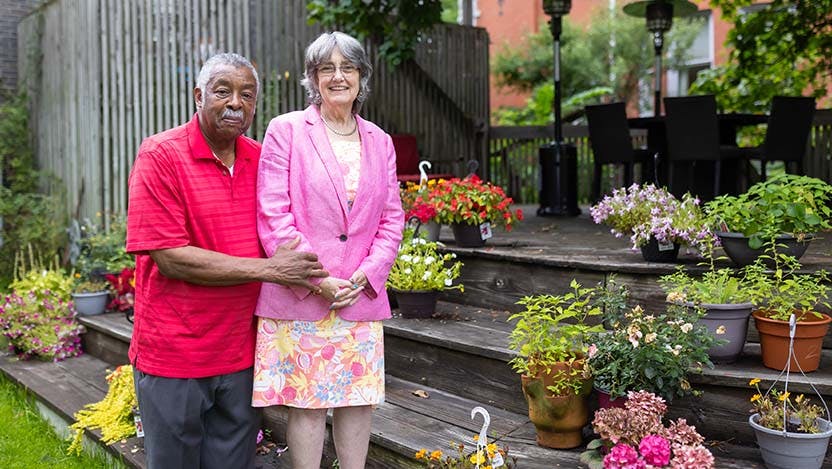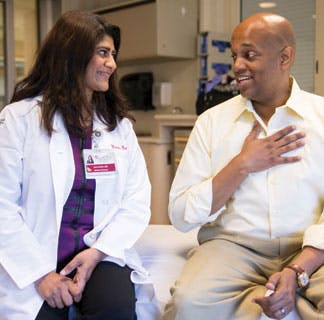‘We’re gonna get this’: How CAR T-cell therapy helped a 72-year-old lymphoma patient become cancer-free

University of Chicago Medicine oncologist Sonali Smith, MD, vowed to McGee that she and her team of lymphoma experts would do everything in their power to help the then-68-year-old Kenwood resident. Smith took McGee’s hand and told her, ‘We’re gonna get this.’”
They did "get it," using CAR T-cell therapy – a treatment that is difficult for cancer patients over age 65.
McGee, now 72, has been in remission since October 2021.
The revolutionary therapy involves removing the patient’s own T-cells (a type of white blood cell) and genetically engineering them with an antibody-like protein called a Chimeric Antigen Receptor (CAR). The engineered cells are then returned to the patient’s body – a process that takes less than 30 minutes – and the new CAR T-cells roam the body, finding and destroying cancer cells. In essence, it uses a patient’s own immune system to attack the cancer.
Before McGee received CAR T, as it’s nicknamed, she underwent aggressive chemotherapy, a stem cell transplant and other treatments. Each one knocked out her cancer temporarily, but it always returned. Meanwhile, she continued to get sicker. That’s when her care team considered CAR T-cell therapy as an option.
“Nothing else was going to cure her. Anything else we could do would be palliative,” Smith said. “It’s both a magical therapy and a difficult therapy. When you have CAR T, there are bumps in the road.”
CAR T no longer just for young cancer patients
Some doctors hesitate to use CAR T-cell therapy on patients over age 65 because the clinical trials that led to its FDA approval largely included younger, healthier patients, said UChicago Medicine lymphoma specialist Peter Riedell, MD, one of McGee’s physicians. Many of those trials were conducted at UChicago Medicine.
However, subsequent studies have shown that CAR T-cell therapy can benefit older patients, according to Riedell.
“This is something we can now perform in patients of advanced age,” he said. “Despite other medical problems and functional limitations a patient may have, we can still get older patients safely through this treatment and it can lead to encouraging long-term outcomes like Therese had.”
Age is just one of the factors doctors consider when determining whether to use CAR T-cell therapy. The severity of a patient's cancer and their current health condition also weighs heavily on the decision, Smith said.
Nothing else was going to cure her ... It’s both a magical therapy and a difficult therapy.The chances of lasting remission with CAR T now stand between 30% and 40%, Smith said. It’s been successfully used to treat many UChicago Medicine lymphoma patients, of whom many were out of treatment options and some were over age 65.
But the older the patient, the more difficult it can be for them to handle the potential side effects of CAR T-cell therapy. These can sometimes include a weakened immune system, flu-like symptoms such as fevers, fatigue and shortness of breath, and neurologic toxicity – a complication that can result in temporary confusion, difficulty speaking and headaches.
“It’s a manageable toxicity that can improve with time, but it can be serious,” Riedell said. “CAR T is not for every single patient.”
Other health conditions such as high blood pressure, hypertension or diabetes can also complicate the therapy. Fortunately, McGee was in good health prior to her cancer diagnosis.
Bumps along the road to remission
In the fall of 2019, McGee, a clinical psychologist, was struggling to eat. Tests uncovered a mass pushing on her stomach and colon, and a biopsy confirmed she had lymphoma. When aggressive cancer treatments were unsuccessful, Smith and Riedell recommended CAR T-cell therapy.After the doctors explained in detail how CAR T works and its potential risks, McGee decided she wanted to try it. Her health insurance and subsidies from a study she was enrolled in helped cover the cost. Plus, she had a strong support system at home to help her recover, especially her husband of 50 years, Bob. The McGees both had full trust and faith in God and UChicago Medicine’s doctors.
“She was determined to beat this. Therese is a fighter,” Smith said.
McGee’s T-cells were removed, flown to Washington state and engineered by a pharmaceutical company to become CAR T-cells. Four weeks later, the new cells were returned to McGee’s bloodstream.
She felt fine the first few days, but then developed cytokine release syndrome (CRS), a potentially dangerous side effect where the immune system overreacts and releases a flood of signaling proteins into the body, leading to high fevers, low blood pressure and breathing difficulties. McGee’s treatment was also complicated by neurologic toxicity where she struggled to speak and became very disoriented.
“I was going in and out of consciousness. My husband was pacing back and forth at the foot of my hospital bed, just in a panic. People from church were calling and texting and praying for me,” McGee said. “Honestly, I didn’t know which way this was going.”
Large doses of steroids successfully stabilized her condition and McGee gradually improved. She still has some lingering memory problems and her immune system remains weak from CAR T, but it is improving, she said.
Her treatment journey has been helped along by UChicago Medicine’s Transplant Optimization Program (TOP), a first-of-its-kind program designed to help adults age 70 and up who are undergoing CAR T-cell therapy (or people over 50 who were undergoing stem cell transplants) with everything from physical therapy to managing co-existing illnesses.
McGee also relied on the Oncology Rapid Assessment Clinic, where she could quickly get an in-person appointment with a doctor or advance practice nurse, sometimes within an hour.
“It’s a recognition that, even when a patient is in remission, they are vulnerable to other health problems,” McGee said.
Smith praised McGee for showing tremendous patience after her initial cancer treatments failed and during her difficult CAR T complications.
“Even when we told her bad news, she was always thanking us,” Smith said. “She trusted us and was willing to partner with us. That speaks volumes.”
McGee said it’s been a long journey but she never lost faith or hope in her care team. They’ve helped her resume a normal life, so she can drive again, work part-time, attend Bible class and visit with friends and family.
“I just feel so grateful. There were problems along the way, but the doctors kept saying, ‘We’re gonna do this or we’re gonna do that. There was so much hope. The expertise at UChicago Medicine has been an incredible blessing in my life,” McGee said. “There’s no reason to think I won’t live many more years.”

UChicago Medicine Comprehensive Cancer Center
UChicago Medicine is designated as a Comprehensive Cancer Center by the National Cancer Institute, the most prestigious recognition possible for a cancer institution. We have more than 200 physicians and scientists dedicated to defeating cancer.
Learn More About the Comprehensive Cancer Center